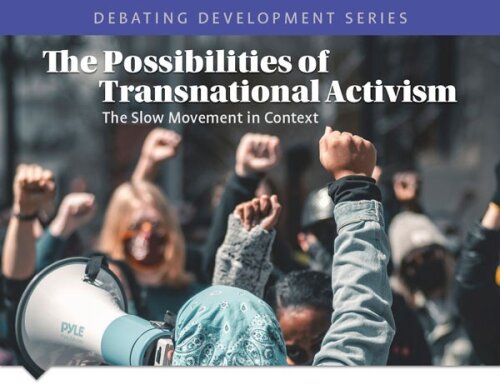
This concluding session will consider the political action of transnational social movements in historical perspective, providing the context for discussion of the possibilities and prospects for the slow movement today. Time or temporalities are a key ingredient in a capitalist system that defines efficiency in terms of speed of execution or delivery. The capitalist modus operandi embraces a fast paced cycle which lays a heavy and persistent demand to act, or react without sufficient grasp of the complexity of reality and potential repercussions implied in the decisions made. Slowing down can hence be seen as way to resist the destructive logic of “a development that should not miss its jump onto the speeding train”. Social struggles/activism of social movements arise from the concern to mitigate the disequilibrium and inequalities resulting from such fast-paced, often political, decisions. The question then becomes, “how do these social movements challenge capitalist structures, in essence, the conception of time on which they are founded?”
In this debate, we turn to slowness as a focus for struggle or social engagement. Professor Thomas Davies will retrace the political action of transnational social movements through time, engaging with the possibilities and prospects for the slow movement today. He will draw attention to the significance of movements in the Global South in pioneering methods of transnational activism and analyze factors that have facilitated and inhibited these activist campaigns. In the ensuing panel exchange, protagonists of different social movements will join the discussion about the conceptualization of slowness in the action of social movements and the challenges and opportunities it entails.
Organised in collaboration with the University Centre Saint Ignatius Antwerp
- 19h00 Welcome by USOS/ IOB/ UCSIA
- 19h10 Lecture by Thomas Davies, Senior lecturer in International Politics, City University of London
In setting out the evolution of transnational social movements, Dr Davies’ presentation will draw attention to the significance of movements in the Global South in pioneering methods of transnational activism serving both reformist and radical goals. The presentation will elucidate the factors that have facilitated and inhibited transnational activist campaigns, as well as the diverse social and political change objectives put forward among transnational social movements not only in relation to states and intergovernmental organizations but also in respect of the varied processes of politics beyond established political institutions. Through its emphasis on transnational non-state politics and the methods and goals put forward among Global South social movements, the presentation will shed light on the wider potential of transnational activism beyond that which has traditionally dominated attention.
Dr Thomas Davies researches and teaches transnational non-state politics at City, University of London. He has published widely on transnational activism, social movements, and non-governmental organizations, and his books include ‘The Possibilities of Transnational Activism’ (Leiden: Martinus Nijhoff, 2007), ‘NGOs: A New History of Transnational Civil Society’ (OUP, 2014), and the ‘Routledge Handbook of NGOs and International Relations’ (editor, 2019). Prior to joining City, University of London, Dr Davies taught at St Catherine’s and New Colleges in the University of Oxford, and he completed his PhD at Magdalen College, Oxford with a thesis that was awarded the British International History Group Thesis Prize. He is a Fellow of the Royal Historical Society. - 19h50 panel debate with protagonists of various social movements:
- Allforclimate, Citizen Spring, Leen Schelfhout is a professional deep democracy facilitator and activist for climate justice and citizen democracy, both on a global level as founder and director of ‘All For Climate’ and on the local level with the dynamic collective ‘Citizen Spring’. She used to be coordinator of the ‘Regenerative Culture Circle of Extinction Rebellion’, and is one of the founding members of ‘Burgerlijst’, a political citizen initiative in Antwerp advocating for full transparency and citizen participation. She is driven by the idea that society should be an inclusive, brave and sustainable environment where people can actively contribute and rebuild connections. Make space for people to achieve system change, not climate change, is her main goal.
- Kahina Rabahi (social justice policy expert) has years of experience in the anti-racist and discrimination NGOs in France and Brussels. After a position at the European Network against Racism, she has been director of the European Network on Religion and Belief from 2018 to 2021. She also has previous experience working for the European Union’s External Action Service as a policy assistant at their office in Palestine, focusing on cooperation with EU member states. Particular topics of concern to her include anti-discrimination and fundamental rights, religious freedom, security and policing of minorities and intersectionality, especially regarding women of colour. Kahina is a former student of SciencesPo Paris, from where she holds a MSc in Economics and a MSC in International Security.
- Fashion Revolution, Ellen Haverhals is a language and journalism student who volunteers as social media content creator for ‘Fashion Revolution Belgium’ in her free time. This organization strives for more transparency in the textile and fashion industry, urging brands to value people and planet over profit and growth. She strongly believes in the idea that knowledge is power and therefore uses her platforms to teach people about the impacts of the (fast) fashion industry on people, planet and animals. Because the more one knows, the better one can act to bring about systemic change.
- 20h30 Q&A
- 21h00 End